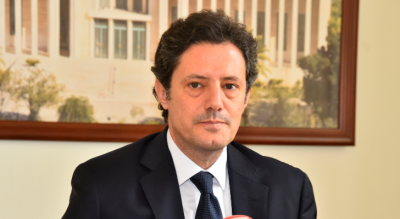Minister of Information in the caretaker government, Ziad Al-Makari, highlighted during an intervention on LBC television that "Lebanese people are asking whether the government makes decisions without executing them, or executes them slowly, or even has no ability to implement them." He noted that "many events occurred this month that have accelerated the pace of interest in this significant issue, which we consider an existential problem for Lebanon."
He discussed the issue of displaced persons who departed by sea to Cyprus, which created a diplomatic crisis with Cyprus, as announced by Prime Minister Najib Mikati. Al-Makari referred to two crimes that resulted in the deaths of citizens from the Turk family in Ashrafieh and Pascal Suleiman in Jbeil, which expedited attention to the matter. He mentioned that the conditions with Cyprus have led its president and government to view the arrival of 2,500 Syrian refugees as dramatic. "What do they say about the situation in Lebanon, where there are two million displaced persons?" he questioned, pointing out that this situation serves as a base for discussions with the Cypriot president and subsequently the European Union, which is seeking new thoughts on resolving the Syrian refugee issue.
He emphasized the importance of recognizing that some regions in Syria are considered safe and stated, "The solution does not involve keeping these displaced persons in Lebanon, but rather their return to Syria or relocation to a third country."
Al-Makari explained that the second aspect consists of the decisions made yesterday, which include practical measures that are more effective than before, such as a directive to governors to close all unlicensed institutions owned by Syrians, and ensuring that the public prosecution communicates with the different regions to consolidate issues related to illegal displaced persons into one judicial reference. He affirmed that Syrians are being deported to safe areas in Syria and that there are laws for the Lebanese state to apply to these displaced individuals, which would form a significant part of the solution.
When asked about the unfortunate perception that some Lebanese consider Syrian workers as employees, he remarked, "Unfortunately, the Lebanese are responsible for this disaster because their thinking leans towards money rather than their patriotism and the future of their country and children, and there is manipulation of the law." He stressed the need to take certain measures in this context, stating that if all these illegal institutions began to close, it would mark a significant starting point, especially since there are tens of thousands of institutions run by Syrians.
Regarding the return convoys and the possibility of resuming them through registration with the General Security as previously done, Al-Makari acknowledged that "the return convoys are a theoretical subject, and I wish it were that simple. The process is very complicated. First, there must be a political solution with Syria, and the siege should be lifted. The international community must also be convinced that there are no military operations in Syria and that it has become safe for the majority of Syrian refugees to return." He reiterated that if the Lebanese state, government, and municipalities began implementing the laws, a substantial amount of work would be accomplished. He added, "All economic displacement in Lebanon will start to diminish, in addition to the fact that funding that existed over the past six years is no longer available."
When asked whether the Lebanese delegation would approach Brussels this time with a different discourse, given its previous diplomatic engagement with the international community, he responded, "Of course, the tone will be different this time. This is the only project agreed upon by the Lebanese throughout Lebanon's history, and there will certainly be one paper with the Lebanese delegation to Brussels. Everything will be transparent, and everyone will know what is happening. We hope for positive outcomes this time regarding communication and actions on justice, defense, social affairs, and labor, and that they will be implemented seriously because the situation can no longer tolerate delay."




